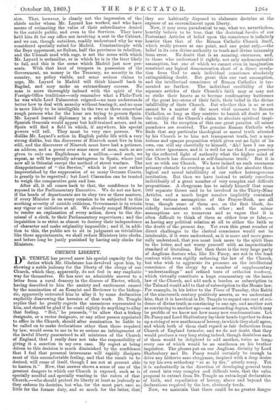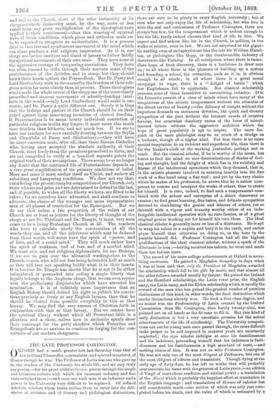CHURCH LIBERTY.
DR. TEMPLE has proved anew his special capacity for the duties which Mr. Gladstone has devolved upon him, by showing a noble jealousy for the liberty of the clergy of our Church, which they, apparently, do not feel in any emphatic way for themselves. He has sent an admirable answer to a letter from a rural deanery in the diocese of Exeter, which, having described to him the anxiety and excitement caused by the nomination of an Essayist and Reviewer to the bishop- ric, apparently entreated him to allay it by some declaration explicitly disavowing the heresies of that work. Dr. Temple replies that he greatly regrets the uneasiness represented to him, and should be glad if he could rightly do anything to allay that feeling. " But," he proceeds, " to allow that a bishop designate, or a rector designate, or any other person appointed to office in the Church, should after nomination be liable to be called on to make declarations other than those required by law, would seem to me to be so serious an infringement of the lawful liberty guaranteed to all ministers of the Church of England, that I really dare not take the responsibility of giving it a sanction in my own case. My regret at being driven to this decision is much diminished by the confidence that I feel that personal intercourse will rapidly dissipate most of this uncomfortable feeling, and that the result to be desired, will come of itself, though I am not at present able to hasten it." Now, that answer shows a sense of one of the greatest dangers to which our Church is exposed, such as is specially needful and specially wanting in the rulers of that Church,—who should protect its liberty at least as jealously as they enforce its doctrine, but who, for the most part, care so little for the former duty, and so much for the latter, that
they are habitually disposed to elaborate doctrine at the expense of an encroachment upon liberty.
Now, it may seem paradoxical to say, what we, nevertheless, heartily believe to be true, that the doctrinal burden of our Protestant Articles of belief upon the conscience is infinitely heavier than that of the Roman Catholic Church itself, which really presses at one point, and one point only,—the belief in its own divine authority to teach and divine immunity from error. No doubt that is an amazing, enormous, and, to those who understand it rightly, not only undemonstrable assumption, but one of which we cannot even in imagination construct any logical demonstration short of a direct revela- tion from God to each individual conscience absolutely extinguishing doubt. But grant this one vast assumption, and the intellectual conscience of Roman Catholics is tor- mented no further. The individual credibility of the separate articles of their Church's faith may or may not. so strike their hearts as to become confirmatory buttresses of the great key-stone of their faith, their belief in the divine infallibility of their Church. But whether this is so or not cannot be a matter of the most vital moment to Roman Catholics, so long as they contrive to banish all doubt as to the validity of the Church's claim to absolute spiritual inspi- ration. In the reception of this one great paradox all minor paradoxes are received. The genuine Roman Catholic who finds that any particular theological or moral truth attested by his Church is to him not transparent truth,-but a mys- terious and opaque proposition which gives out no light of its- own, can still say cheerfully to himself, Ah 1 here I see my own utter ignorance, and it is well for me that I can perceive by the reflected light of authority what the higher mind of the Church has discerned as self-luminous truth.' But it is. not so with our Church. We have indeed no such enormous primary obstacle to overleap as a belief in the absolute theo- logical and moral infallibility of our rather heterogeneous institution. But then we have instead to satisfy ourselves individually of a great number of very complex and difficult propositions. A clergyman has to satisfy himself that some 900 separate theses said to be involved in the Thirty-Nine Articles, and a much larger number implicitly contained in the various assumptions of the Prayer-Book, are all true, though some of them are, on the first blush, de- cidedly inconsistent with each other ; and the minor assumptions are so numerous and so vague that it is often difficult to think of them as either true or false,— as having any political relation at all to either the faith or the doubt of the present day. Yet even this great number of direct challenges to the clerical conscience would not be intolerable, if it were understood, as it is more and more gene- rally understood, that you must look more to the spirit than to the letter, and not worry yourself with an impracticable standard of literalism. But then there is the very large party of Anglican doctors who, like Dr. Pusey, are not in the least content with even rigidly enforcing the law of the Church, but who wish to aggravate its pressure on the intellectual conscience of the clergy by a number of supplementary " understandings" and refined tests of orthodox tendency, which virtually constitute a huge commentary on the inner law of the Church, and add such a burden as subscription to the Talmud would add to that of subscription to the Mosaic law. For example, in his letter to the Times of Tuesday, this Rabbi of the nineteenth century positively asserts, as we understand him, that it is heretical in Dr. Temple to regard one sort of evi- dence of divine truth as convincing to one age, and another sort as convincing to another age—an astounding dogma, which may be prolific of we know not how many new condemnations. Let Dr. Pusey and Lord Shaftesbury lay their heads together to draw up a string of new anathemasof heresy, in which they shall agree, and which both of them shall regard as fair deductions from Church of England formulae, and we do not doubt that they would produce a very long string indeed, though doubtless each of them would be delighted to add another, twice as long,- every one of which would be an anathema on his brother inquisitor. The glosses put on our Anglican divinity by Lord Shaftesbury and Dr. Pusey would certainly be enough to drive any hitherto sane clergyman, inspired with a deep desire to try his own orthodoxy " so as by fire," utterly crazy. Yet it is undoubtedly in the direction of developing general tests of creed into very complex and difficult tests, that the calm proposal to extract from Dr. Temple an extra-legal declaration of faith, and repudiation of heresy, above and beyond the declarations required by the law, obviously tends.
Now, we maintain that there could be no greater danger
and evil to the Church, short of the utter insincerity of its clergy—(which insincerity must, by the way, more or less result from any great multiplication of the theological tests applied to their consciences)—than this weaving of external webs of fresh conditions which pious and orthodox souls are to be expected to recognize as authoritative. It is a process fatal to that free and spontaneous movement of the mind which can alone produce a real religions impression. As it is, our clergy are far too cautious and timid of heresy to follow boldly the spiritual movements of their own souls. They have none of the aggressive courage of conquering convictions. They have too often learned to sidle, through their nervous sense of the protuberances of the Articles, and to stoop, lest they should knock their heads against the Prayer-Book. But Dr. Pusey and Lord Shaftesbury wish to circumscribe the freedom of their reli- gious action far more closely than at present. These theologians would make the whole course of the clergy one of the most closely prescribed and sinuous movements of adroitly-bending intel- lects in the world,---only Lord Shaftesbury would make it one course, and Dr. Pusey a quite different one. Surely it is time that the bishops and pastors of the Church should be on their guard against these innovating invasions of clerical freedom. If Protestantism is to mean hearty individual conviction of particular religious truths any longer, it must mean also much more freedom than hitherto, and not much less. If we are to have our teachers for ever carefully steering between the Scylla and Charybdis of Pusey and Shaftesbury,—they will have far more careworn souls, after all, than those Roman Catholics who, having once accepted the absolute authority of their Church, start freely from the premisses prescribed to them, and are not compelled to verify at a hundred separate points the original truth of their assumptions. There seems to us no longer any doubt that the continued life of Protestantism depends on a very great simplification of its primary conditions of belief. More and more it must anchor itself on Christ, and eschew all subsidiary and hampering conditions. We dare not say that, considering the present complex composition of our Church, only those who see and prize and are determined to defend to the last, and, if possible, to widen all the liberty we have, are fitted to be rulers ; for we ourselves have advocated, and shall continue to advocate, the choice of the stronger and more representative men of all phases of conviction for the Episcopate. But we do say that unless a fair proportion of the rulers of our Church are at least as jealous for the liberty of thought of the clergy as are Dr. Thirlwall and Dr. Temple, it must very soon cease to be a living Protestant Church at all. The teachers who have to calculate nicely the construction of all the words they use, and all the inferences which may be deduced from those words, will never have the spirit of " power, and of love, and of a sound mind." They will much rather have the spirit of weakness, and of fear, and of a morbid mind. We want men, and not religious diplomatists, for our Bishops, if we are to gain over the alienated working-class to the Church,—men who will not fear being heterodox half as much as they will fear not speaking boldly what is in their hearts. It is because Dr. Temple has shown that he is not to be either intimidated or persuaded into ceding a single liberty that legally belongs to the Anglican clergy, that we can even rejoice over the preliminary disquietudes which have attended his nomination. It is of infinitely more importance that an English Bishop should defend his right to publish his convic- tions precisely as freely as any English layman, than that he should be cleared from possible complicity in this or that heresy. We may find the very essence of Christian faith in conjunction with this or that heresy. But we cannot have the spiritual liberty without which all Protestant faith is a phantom and a sham, unless men in authority openly show their contempt for the petty shackles which Puseyites and Evangelicals are so anxious to combine in forging for the con- sciences of our modern clergymen.































 Previous page
Previous page